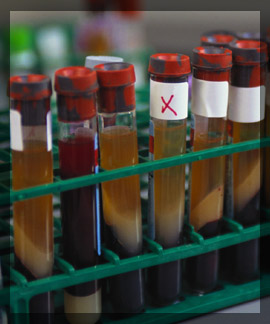Aviso de archivo
Esta es una página de archivo que ya no se actualiza. Puede contener información desactualizada y es posible que los enlaces ya no funcionen como se pretendía originalmente.
Home | Glossary | Resources | Help | Contact Us | Course Map
If the defendant seeks to retype the DNA evidence, the prosecutor should petition the court to require the defense to provide certain information in order to reasonably assure that the integrity of the evidence is maintained. In some jurisdictions, prior to the transfer of the evidence sample to the defense, the government will require a stipulation that the defense waives any future challenge to the chain of custody as to the break in the chain from the time the evidence sample left the government's control to the time it is returned. This preserves the government's ability to retest and rebut if necessary.
Prosecutors should request that the court require the defense identify the expert and lab conducting the re-typing, their qualifications and accreditation, and the nature of the proposed typing or analysis. ABA Standards Criminal Justice, Standard 11-3.2(b) (3rd ed. 1994). Additionally, request that the court impose "appropriate safeguards" on any defense retyping, including a demonstration by the proposed laboratory of compliance with standards and laboratory accreditation at least equal to that of the lab that conducted typing on behalf of the state.
Many labs will "split" samples. If a sufficient sample for retyping exists, the prosecutor should advise defense counsel, on the record, for two reasons. First, if later defense experts testify that an error in the original typing occurred, a state witness, taking care not to engage in burden shifting, may testify that a sufficient sample to retest exists. Secondly, a failure to retype after being advised that a sufficient sample for retyping exists, constitutes a lack of "due diligence" that may preclude future motions for a new trial or post-conviction relief.
Additional Online Courses
- What Every First Responding Officer Should Know About DNA Evidence
- Collecting DNA Evidence at Property Crime Scenes
- DNA – A Prosecutor’s Practice Notebook
- Crime Scene and DNA Basics
- Laboratory Safety Programs
- DNA Amplification
- Population Genetics and Statistics
- Non-STR DNA Markers: SNPs, Y-STRs, LCN and mtDNA
- Firearms Examiner Training
- Forensic DNA Education for Law Enforcement Decisionmakers
- What Every Investigator and Evidence Technician Should Know About DNA Evidence
- Principles of Forensic DNA for Officers of the Court
- Law 101: Legal Guide for the Forensic Expert
- Laboratory Orientation and Testing of Body Fluids and Tissues
- DNA Extraction and Quantitation
- STR Data Analysis and Interpretation
- Communication Skills, Report Writing, and Courtroom Testimony
- Español for Law Enforcement
- Amplified DNA Product Separation for Forensic Analysts



